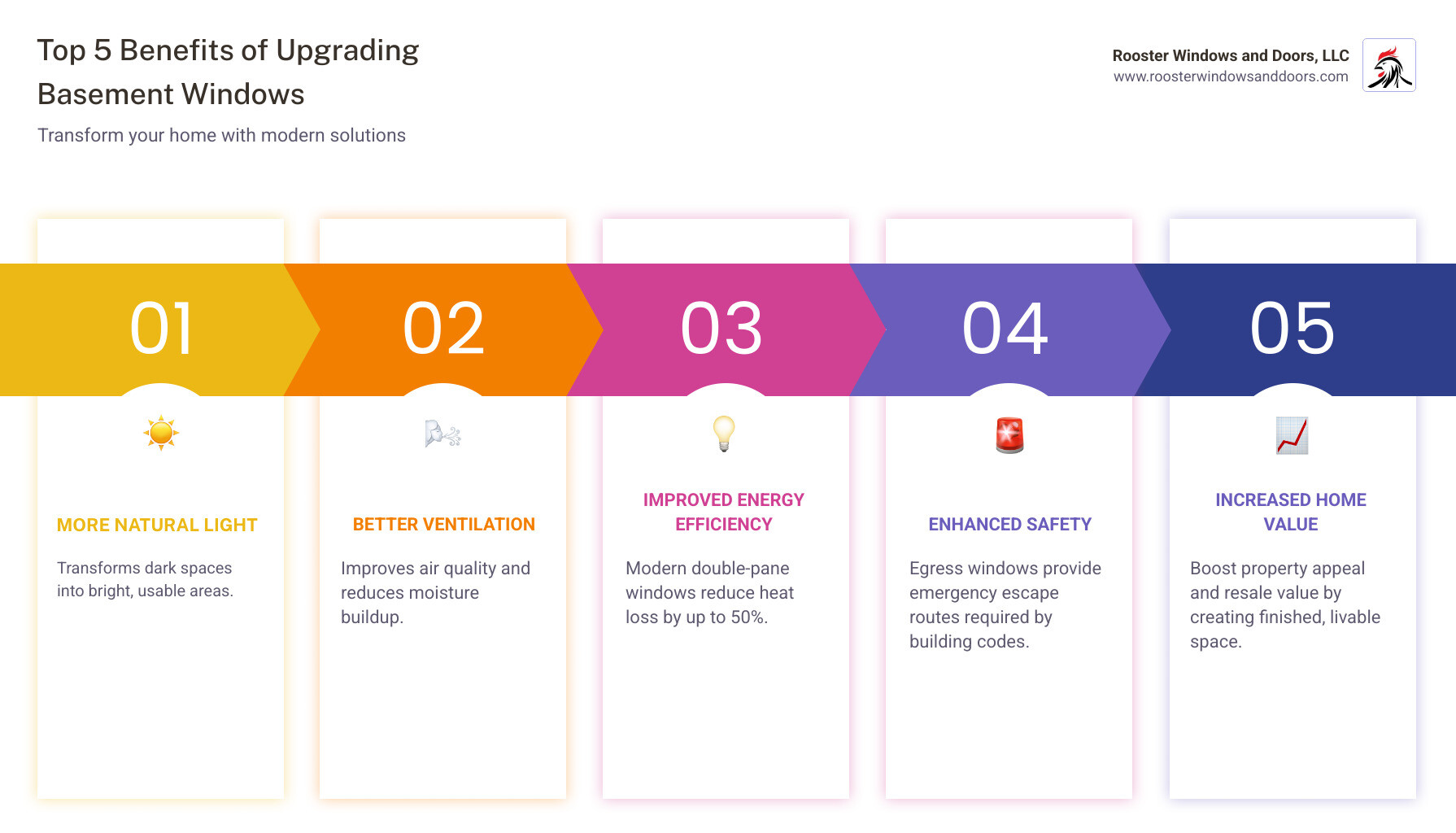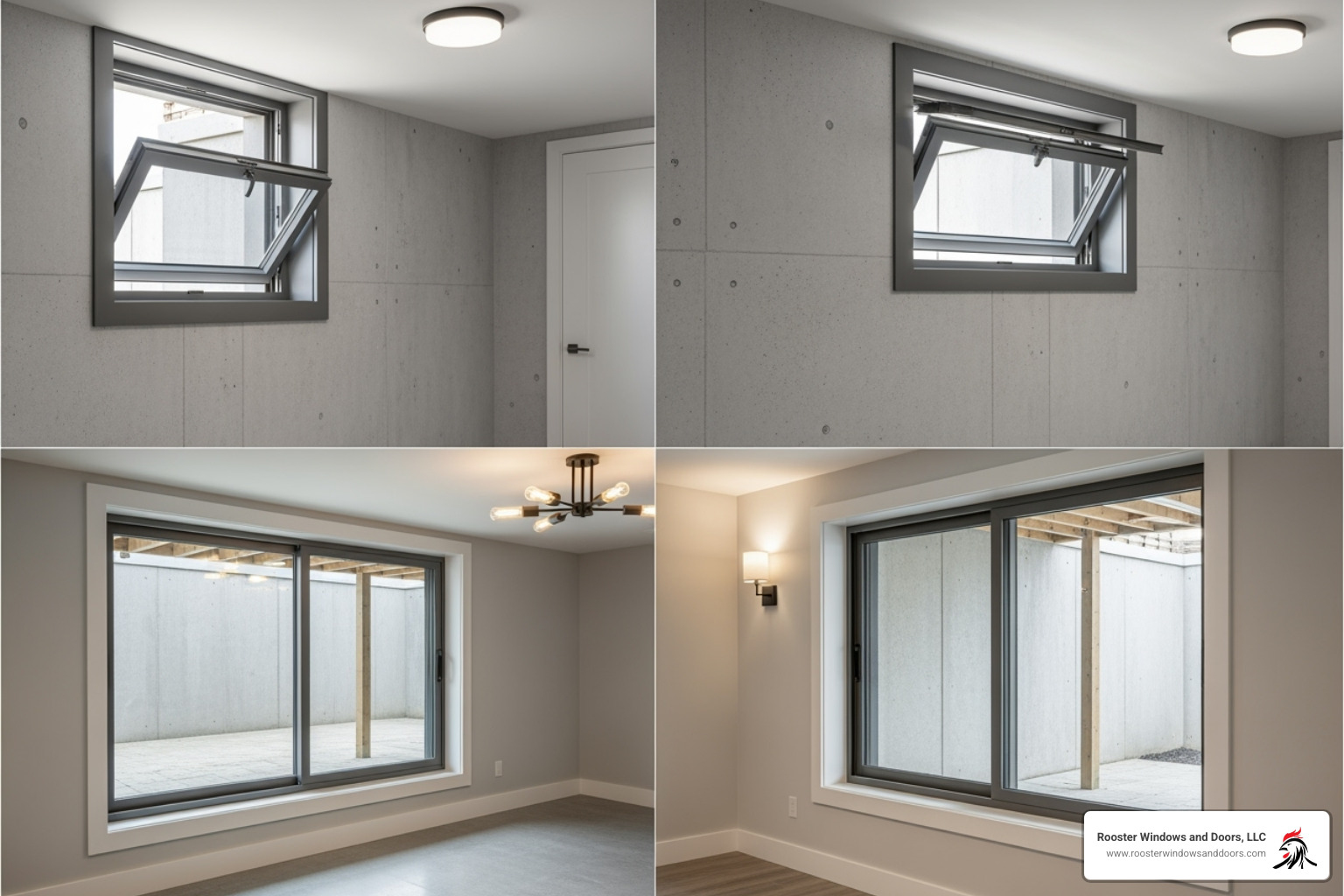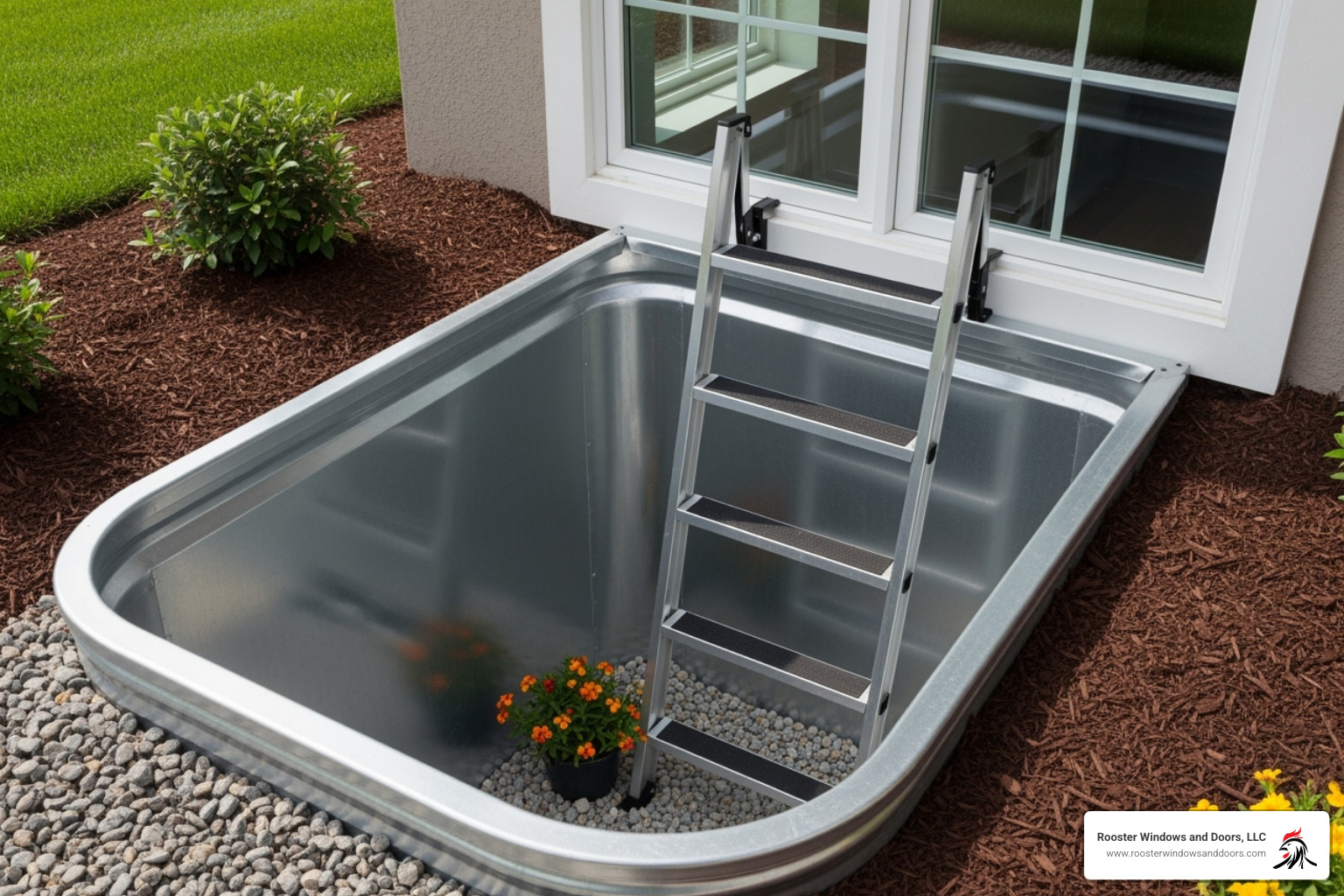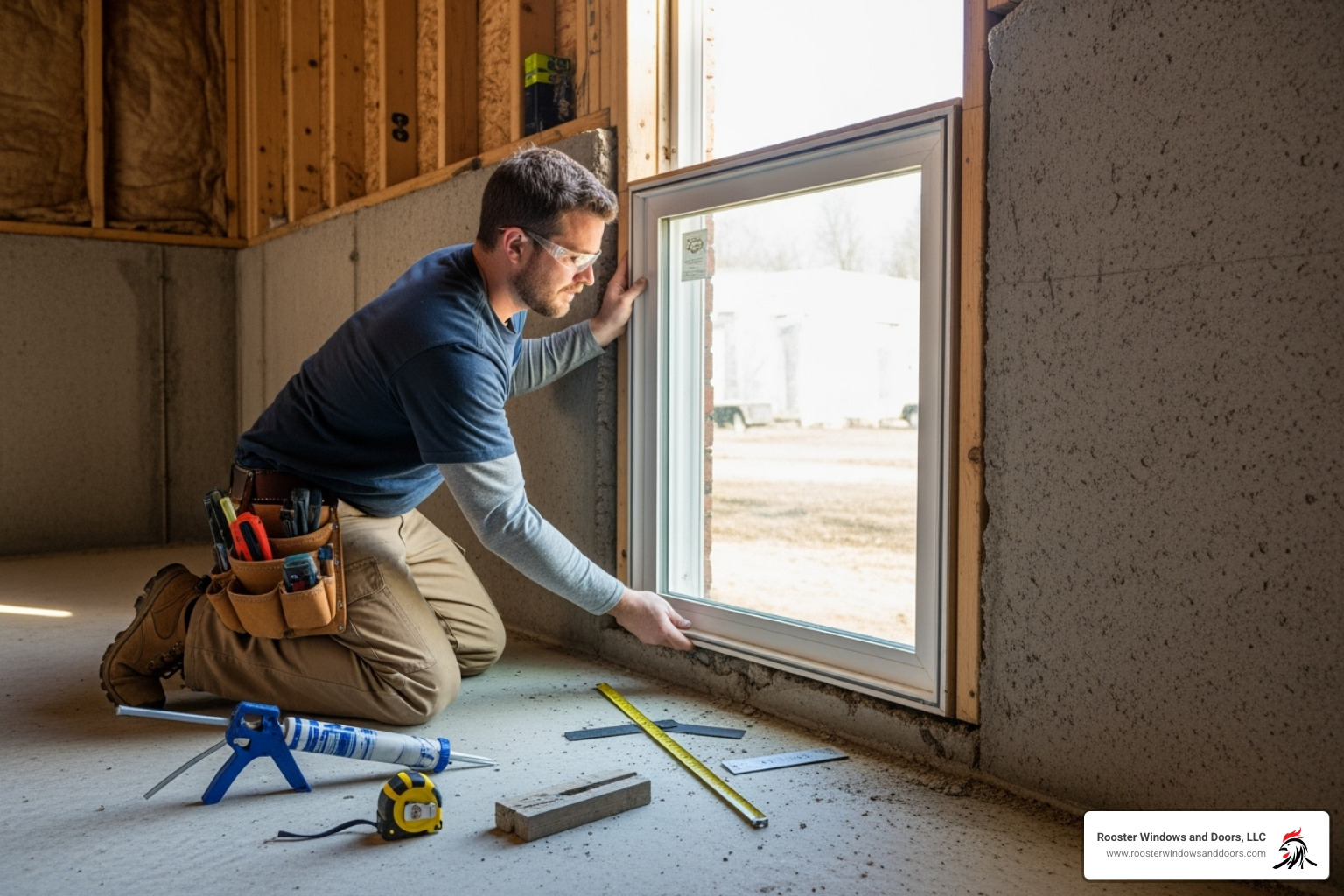Why Basement Windows Matter More Than You Think
Basement Windows are often overlooked, yet they are crucial for changing dark, unwelcoming basements into bright, functional living areas. Whether you’re finishing your basement, adding a bedroom, or improving energy efficiency and safety, understanding your window options is essential.
Here’s what new basement windows can do for your home:
- Natural Light & Ventilation: Brighten dark spaces and improve air quality.
- Safety & Egress: Provide required emergency exits for habitable rooms.
- Energy Efficiency: Reduce heat loss and lower utility bills.
- Home Value: Increase property appeal and resale value.
- Moisture Control: Help prevent dampness and mold.
Many older basement windows suffer from rot, drafts, and poor insulation from single-pane glass. These issues lead to high energy costs, uncomfortable temperatures, and pest entry. Replacing them with modern, properly sized windows solves these problems and expands how you can use your basement.
As Piotr Wilk, with over two decades of experience installing windows in the Chicagoland area, I’ve helped countless homeowners transform their basements with the right Basement Windows. This guide covers everything you need to know to make the best choice for your home.

Types of Basement Windows and Their Pros & Cons
Not all Basement Windows are created equal. The type you choose determines how much light and air you get, as well as the security of your home. Let’s walk through your options to find the perfect fit.

Each style has its own strengths. Here’s how they stack up:
| Window Type | Cost (Relative) | Ventilation | Security | Best Use Cases |
|---|---|---|---|---|
| Hopper | Low | Excellent | Moderate | Utility rooms, small spaces, budget-friendly |
| Awning | Moderate | Good | Moderate | Damp climates, kitchens, bathrooms, all-weather ventilation |
| Sliding | Moderate | Good | Moderate | Wide openings, easy operation, modern aesthetic |
| Double-Hung | High | Excellent | Moderate | Finished basements, living areas, traditional aesthetic |
| Glass Block | Moderate | None | High | Privacy, security, energy efficiency, non-operable |
Hopper Windows
Hinged at the bottom, hopper windows open inward from the top. They are a popular and cost-effective choice for basements, offering excellent ventilation by pulling in fresh air while pushing out stale air. Since they open inward, they don’t obstruct exterior pathways, making them ideal for tight spaces. The main trade-off is that the inward swing can collect dust on the sill, and they require good locks for security.
Best for: Laundry rooms, utility areas, or anywhere you need great airflow on a budget.
Awning Windows
Awning windows are hinged at the top and open outward from the bottom, creating a small canopy. This clever design allows you to keep them open for ventilation even during light rain, making them perfect for damp climates. They provide good airflow, though they require clearance on the outside to open fully.
Best for: Basement bathrooms, kitchens, or any space where all-weather ventilation is a priority.
Sliding Windows
Sliding windows have one or more panels that slide horizontally. Their simple design is easy to operate and works well for wider openings, letting in plenty of natural light. They offer a clean, modern look at a moderate price. The only limitation is that ventilation is restricted to the size of one open panel, and the tracks require occasional cleaning.
Best for: Basements with wider window openings where maximizing light is a goal. More info about our window services.
Double-Hung Windows
Double-hung windows feature two sashes that move up and down independently, offering excellent ventilation control. While less common in below-grade basements, they are a great choice for walkout basements or rooms with taller walls. Their classic aesthetic can match the windows in the rest of your home, but they require more vertical space and are a pricier option.
Best for: Finished walkout basements where you want to match the style of your upper floors.
Glass Block Windows
Glass block windows are solid panels of thick glass mortared together, offering maximum privacy and security. They allow diffused natural light to enter while making it impossible to see inside. They are also highly energy-efficient and provide soundproofing. The main drawback is the lack of ventilation unless a separate vent is installed. Many window styles serve different purposes, but glass blocks are in a category of their own.
Best for: Bathrooms, home gyms, or any area where light and security are needed without an operable window.
Egress Windows: A Critical Component for Safety and Code Compliance
When planning a finished basement with a bedroom or other living space, you’ll encounter the term “egress window.” These aren’t an upsell; Egress windows are life-saving features required by building codes to provide a safe emergency exit.

What Are Egress Windows?
An egress window is an emergency exit for your basement. In a fire or other situation blocking the stairs, it provides an escape route for your family and an entry point for emergency personnel. The word “egress” simply means “exit.”
These windows are larger than standard Basement Windows and must meet specific size and accessibility requirements. If you’re finishing your basement to include any habitable living space, egress windows are mandatory under the International Residential Code (IRC) and local building codes. A basement bedroom without proper egress is a safety hazard, which is why inspectors are so strict about these rules. More info about Egress Window Installation.
Understanding Egress Requirements for Basement Windows
Egress windows must meet specific standards. While local codes vary, most follow the IRC baseline. Key requirements include:
- Minimum Clear Opening: At least 5.7 square feet (5 sq. ft. for ground-level floors). This is the actual open space, not the frame size.
- Minimum Opening Dimensions: At least 24 inches high and 20 inches wide.
- Maximum Sill Height: No more than 44 inches from the floor to the bottom of the window opening. A permanent step is required if it’s higher.
- Operability: Must open from the inside without keys, tools, or special knowledge.
- Window Well: If the window is below grade, a well is required. It must have at least 9 square feet of area and project at least 36 inches from the foundation. If the well is deeper than 44 inches, a permanent ladder or steps are needed.
Proper window well installation, including drainage, is critical to prevent water issues. Egress Window Installation Cost details the investment for a correct installation.
Always check with your local building department before starting. Requirements in the Chicagoland area can differ between municipalities. Getting it right the first time ensures your family’s safety, passes inspection, and adds real value to your home.
Key Factors for Choosing Your New Basement Windows
Picking the perfect Basement Windows is a long-term investment in your home’s comfort, safety, and value. The right windows must handle moisture, improve energy efficiency, and provide security. To explore various styles, you can check out several window styles.
Let’s walk through the key factors that will help you make the best choice.
Window Materials: Durability Meets Design
Basement environments have high humidity, so your window frame material must resist moisture without warping or rotting.
- Vinyl frames are the most popular choice. They are moisture-resistant, never need painting, and provide excellent insulation. Modern vinyl comes in various colors and styles with virtually zero maintenance.
- Wood frames offer a classic look and are natural insulators. However, they require regular sealing or painting to prevent rot, making them better suited for walkout basements with less moisture exposure.
- Fiberglass frames are the heavy-duty option. They are incredibly strong, won’t warp, and offer exceptional insulation. While they have a higher upfront cost, their durability makes them a worthwhile long-term investment.
We focus on materials built to last in basement conditions, so you’re not facing another replacement in a few years.
Glazing and Energy Efficiency
Older, single-pane Basement Windows are a major source of energy loss. Upgrading your glazing is one of the smartest moves you can make.
Double-pane glass, or insulated glass units (IGUs), features two panes of glass with a sealed space in between. This buffer dramatically reduces heat transfer, making your windows more energy-efficient and lowering utility bills.
For even better performance, consider these upgrades:
- Low-E coatings: A microscopic layer reflects heat, keeping it inside during winter and outside during summer.
- Argon gas fill: This dense gas is used to fill the space between panes, providing better insulation than air.
A window’s U-factor measures how well it prevents heat loss (lower is better). Modern windows with these features have significantly lower U-factors than old single-pane windows, resulting in a more comfortable basement year-round. Learn more about How to Insulate Windows.
Security, Sizing, and Custom Features
Basement windows can be a security risk, but modern features can make them secure and functional.
Reinforced locks and multi-point locking systems are far more secure than a single latch. Tempered glass is another smart upgrade, as it’s four times stronger than standard glass. For sizing, many basements require custom dimensions, especially for egress windows. Professional installation ensures a precise, secure fit.
Don’t forget finishing touches like integrated insect screens for ventilation, or privacy glass for bathrooms and bedrooms. For added protection and style, consider specialized Covers for Basement Windows. Your basement windows should keep your family safe, your home comfortable, and your energy bills reasonable.
Benefits and Installation of New Basement Windows
Replacing old, inefficient Basement Windows is a high-impact home improvement project, affecting everything from energy bills to comfort and home value.

Why Replace Your Old Basement Windows?
Many homeowners assume a cold, drafty basement is unavoidable, but the issue often stems from failing windows. Old frames rot, crack, and allow drafts, while single-pane glass offers almost no insulation.
Replacing old Basement Windows solves these problems. New vinyl windows resist moisture and won’t rot. Modern double-pane glass with Low-E coatings dramatically reduces heat transfer, leading to lower utility bills and a comfortable basement year-round. New windows also bring in more natural light, improve ventilation to control moisture, and feature tight seals that keep pests out.
Financially, updated Basement Windows boost curb appeal and home value. Potential buyers see modern, well-maintained windows as a sign of a cared-for home, saving them from a future replacement project.
Installation Considerations
Basement window installation is different from upper-floor installations due to the below-grade location. Professional installation is essential to manage water and protect your investment.
Proper sealing and flashing are critical to create a watertight barrier and direct water away from the foundation. Improper sealing can lead to costly water damage. We use proven techniques, like creating a vertical slot under the drain holes to cover a flashed-in drip edge, preventing water from getting behind the siding.
For windows requiring a window well, the installation is more complex. The well must be correctly sized, securely attached, and have adequate drainage. An improperly drained well can fill with water, putting pressure on the window and risking a flood. The drainage system must direct water away from the foundation, which requires expertise in grading and water management.
Professional installation ensures your windows are energy-efficient, code-compliant, and protected from water infiltration for years. For more details, see our Window Installation Services Complete Guide and explore our Window Replacement services.
Frequently Asked Questions about Basement Windows
When considering new Basement Windows, it’s natural to have questions. Here are answers to the most common ones we hear from homeowners in Chicagoland.
What are the building code requirements for basement windows?
Building codes for Basement Windows depend on how the space is used. If you are adding a bedroom or any living space, egress window requirements are mandatory. These safety standards dictate minimum opening sizes, maximum sill height, and window well specifications to ensure a safe emergency exit.
Codes may also require operable windows or mechanical systems for ventilation. Since requirements vary by municipality, I always recommend contacting your local building department before starting a project to ensure compliance and avoid failed inspections.
What is the typical price range for different types of basement windows?
The cost of Basement Windows varies based on type, material, glazing, and size. Hopper windows are often the most budget-friendly, while a full egress system is at the higher end. Vinyl frames offer the best value, while fiberglass costs more but provides superior durability.
Upgrades like double-pane glass with Low-E coatings increase the initial cost but save you money on energy bills over time. Custom sizing and complex installations, such as cutting concrete or adding a window well, also affect the final price. An investment in quality windows provides strong returns through energy savings, increased home value, and improved safety. For a detailed breakdown, see our guide on the Cost to Replace a Window.
How do I maintain my basement windows?
Modern Basement Windows, especially those with vinyl frames, require minimal maintenance. A few simple steps will keep them performing well for years.
- Clean regularly: Wipe down the glass and frames with mild soap and water a few times a year.
- Inspect seals: Check the caulking around the frame for cracks or gaps and re-caulk as needed to prevent drafts and moisture.
- Clear window wells: Remove leaves, snow, and debris from window wells each spring and fall to ensure proper drainage.
- Check hardware: Occasionally lubricate hinges and locks to ensure smooth operation and security.
These simple tasks extend the life and performance of your windows. For more tips, visit our Window Maintenance guide.
Transform Your Basement with the Right Windows
Your basement holds incredible potential, and the journey to open uping it begins with the right Basement Windows. As we’ve covered, new windows can transform a dark space with natural light, improve air quality, improve safety with egress options, and lower your energy bills.
Choosing the right window means understanding your needs, from meeting code for a new bedroom to selecting materials that withstand moisture. It’s about making a smart investment that increases your home’s value and livability.
Here in the Chicagoland area, Rooster Windows and Doors has over two decades of experience with the unique challenges of Illinois basements. Our expertise ensures every installation is code-compliant, properly sealed, and built to last. We offer high-quality, energy-efficient installations with a wide variety of options, from simple hopper windows to full egress systems.
Don’t let your basement remain dark and underused. With the right windows and professional installation, it can become a bright, safe, and welcoming part of your home.
Ready to transform your basement? Learn more about our basement window services and take the first step today.